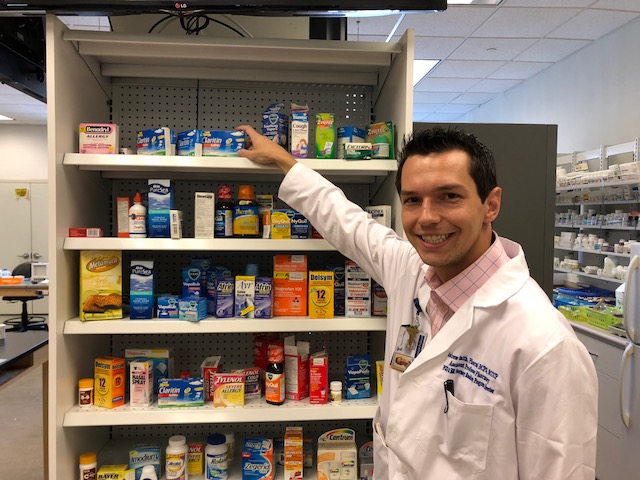Taking Aim at Opioid Addiction
Two doctors partner to better understand why certain patients are more likely to become addicts

With seven Americans dying every hour of opioid overdose, the United States is facing a health emergency. Touro College of Pharmacy is on the front lines with research and education initiatives to help further the scientific understanding of opioid addiction and prepare future pharmacists to respond to the crisis in their workplaces.
OPIOID RECEPTOR A118G
Despite the ever-increasing group of opioids available both legally as a short-term therapy to manage pain or illegally, there are many unknowns about the underlying mechanism of addiction. Dr. Priyank Kumar, Ph.D., Assistant Professor of Pharmacology, Lab of Addiction Neuroscience and Metabolic Disorders, and head of lab research in pharmaceutical and biomedical sciences at Touro College of Pharmacy, set out to learn why some patients are less sensitive to opioids and more prone to addiction than others.
Through an extensive literature review of about 60 studies exploring how a genetic variation could influence drug metabolism and addiction, Dr. Kumar found that patients with the A118G polymorphism (genetic variation) rather than the standard A118A genotype responded differently to morphine. Those patients with the genetic variation experienced less morphine-induced respiratory depression and were less sensitive to the standard dosages set for different opioid medications. These patients did not experience the same pain relief from standard doses.
“Knowing which patients have this genetic variation could be useful for making more precise, effective treatment decisions and practicing caution with long-term opioid use,” says Dr. Kumar, who suggests screening patients before receiving opioid-based pharmacotherapy. “Such testing is done routinely when treating illnesses like cancer, and many medications are designed based on this information. But for pain medications, such genetic testing is not popular,” said Dr. Kumar.
The study, which was co-authored by Iryna Pokotylyuk while she was a student at Touro College of Pharmacy, was presented at the Touro College Research Day in 2016. The manuscript was submitted to EC Pharmacology and Toxicology and has been accepted for publication. Phase II of the study is expected to begin later this year.
PHARMACISTS ON THE FRONT LINES
“For most people, their local pharmacist is the healthcare provider they see most regularly, often the one they feel the most comfortable with, and the one that is the most available,” says Andrew Smith, Pharm.D., BCPS, BCCCP, Assistant Professor and PGY-2 EM Pharmacy Residency Program Director, Touro College of Pharmacy. “Patients will frequently ask a pharmacist questions that they are afraid to ask a physician. Part of the training of pharmacy students is preparing them for this role.”
By the time Touro pharmacy students graduate and enter the workforce, they have acquired a broad knowledge of opioid use disorder treatment options, their side effects, how to recognize addiction/abuse, and antidotes to reverse the effects of these medications. The experiential curriculum also offers students the opportunity to teach patients and family members living with loved ones suffering from opioid use disorder, including encouraging calls to 911 if they or their loved ones find themselves in trouble, offering information about drug rehabilitation, and furnishing naloxone hydrochloride injection kits, an emergency treatment for reversal of opioid overdose. Furthermore, students get involved in counseling patients and family members about proper use of the life-saving medication.
“In many states including New York, anyone can purchase a naloxone kit, which will provide approximately thirty minutes of time, enough time for an emergency medical team to arrive,” says Professor Smith, who also serves as a practicing pharmacist in emergency medicine at Saint Barnabas Hospital in Bronx, New York, where, several days a week, two Touro pharmacy students work as interns alongside him. “For the person or family dealing with opioid addiction, this can be life-saving.”

